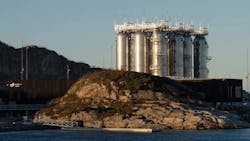First CO2 stored in Northern Lights North Sea reservoir
Injection of CO2 has started at the Aurora reservoir in the North Sea for the Northern Lights carbon capture and storage (CCS) project, Equinor reported Aug. 25.
The Equinor-led partnership is now storing the first volumes in the reservoir, 2,600 m subsurface and 100 km offshore western Norway.
Emitted CO2 captured from Heidelberg Materials’ cement factory in Brevik is shipped to the Northern Lights’ reception facilities in Øygarden, TotalEnergies also reported Aug. 25.
There, it is offloaded and then transported through a 100-km subsea pipeline for injection into the Aurora reservoir.
“With CO2 safely stored below the seabed, we mark a major milestone. This demonstrates the viability of carbon capture, transport and storage as a scalable industry. With the support from the Norwegian government and in close collaboration with our partners, we have successfully transformed this project from concept to reality.”
—Anders Opedal, CEO, Equinor
Equinor, Shell and TotalEnergies are equal partners in the joint venture (JV). Equinor, as technical service provider, was responsible for construction of the onshore Øygarden facility and offshore facilities, and it has operational responsibility for the CO2 plant.
With the start of operations of Northern Lights, we are entering a new phase for the CCS industry in Europe. This industry now moves to reality, offering hard-to-abate sectors a credible and tangible way to reduce CO2 emissions.—Arnaud Le Foll, SVP New Business - Carbon Neutrality, TotalEnergies
“Lifting new value chains like CO2 capture, transport and storage requires collaboration and effort across the value chain— from governments, industry and customers…," Irene Rummelhoff, evp of MMP in Equinor, added. “Now, we look forward to leading safe and efficient operations on behalf of the Northern Lights partnership and use this as a stepping stone for the further development of CCS in Europe.”
Phase 1 of the development, which has a total capacity of 1.5 MMt/year of CO2, is now complete, with its capacity fully booked.
In March, the JV took FID on Phase 2 of the development, which will raise transport and storage capacity to a minimum of 5 MMt/year. It followed the signing of an agreement to transport and store up to 900,000 mt/year of CO2 with Stockholm Exergi.
Expansion of the development will involve adding further onshore storage tanks, a new jetty and more injection wells. The nine new CO2 storage tanks should be delivered to Øygarden shortly.
Phase 1 of Northern Lights is part of the Norwegian government’s Longship full-scale CCS project. The government is funding about 80% of the cost for Phase 1.
Phase 2 expansion of Northern Lights received €131 million (US$ 152.1 million) in June last year from the EU’s Connecting Europe Facility for Energy program.
About the Author
Jeremy Beckman
Editor, Europe
Jeremy Beckman has been Editor Europe, Offshore since 1992. Prior to joining Offshore he was a freelance journalist for eight years, working for a variety of electronics, computing and scientific journals in the UK. He regularly writes news columns on trends and events both in the NW Europe offshore region and globally. He also writes features on developments and technology in exploration and production.

